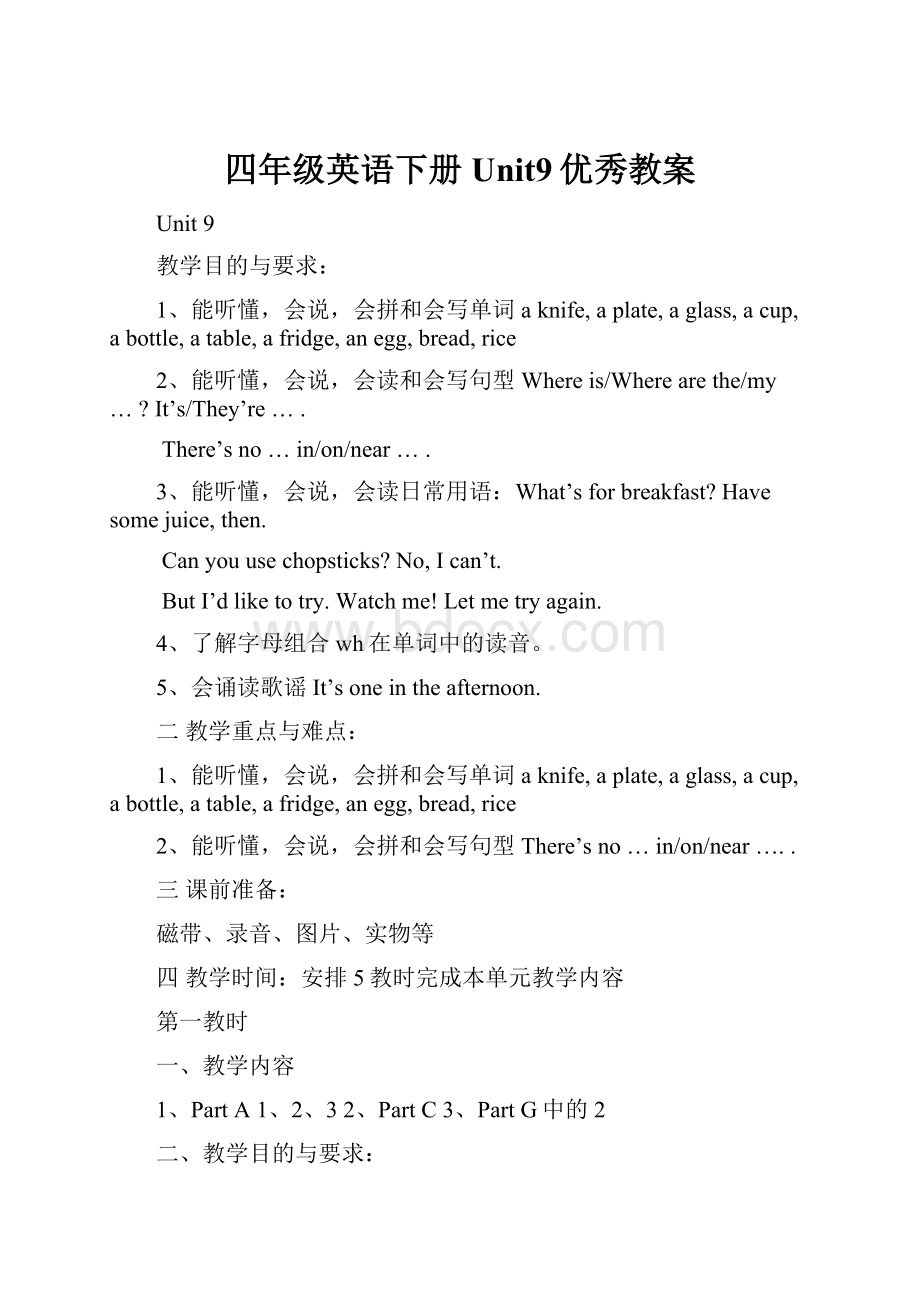四年级英语下册Unit9优秀教案.docx
《四年级英语下册Unit9优秀教案.docx》由会员分享,可在线阅读,更多相关《四年级英语下册Unit9优秀教案.docx(16页珍藏版)》请在冰豆网上搜索。

四年级英语下册Unit9优秀教案
Unit9
教学目的与要求:
1、能听懂,会说,会拼和会写单词aknife,aplate,aglass,acup,abottle,atable,afridge,anegg,bread,rice
2、能听懂,会说,会读和会写句型Whereis/Wherearethe/my …?
It’s/They’re….
There’sno…in/on/near….
3、能听懂,会说,会读日常用语:
What’sforbreakfast?
Havesomejuice,then.
Canyouusechopsticks?
No,Ican’t.
ButI’dliketotry.Watchme!
Letmetryagain.
4、了解字母组合wh在单词中的读音。
5、会诵读歌谣It’soneintheafternoon.
二教学重点与难点:
1、能听懂,会说,会拼和会写单词aknife,aplate,aglass,acup,abottle,atable,afridge,anegg,bread,rice
2、能听懂,会说,会拼和会写句型There’sno…in/on/near…..
三课前准备:
磁带、录音、图片、实物等
四教学时间:
安排5教时完成本单元教学内容
第一教时
一、教学内容
1、PartA1、2、32、PartC3、PartG中的2
二、教学目的与要求:
1、能听懂,会说,会拼和会写单词aglass,acup,atable,anegg,bread,rice
2、能听懂,会说,会读和会写句型Whereis/Wherearethe/my…?
It’s/They’re_____.
3、能听懂,会说,会读日常用语:
What’sforbreakfast?
三、教学重点与难点:
1、能听懂,会说,会拼和会写单词aglass,acup,atable,anegg,bread,rice
2、能听懂,会说,会读和会写句型Whereis/Wherearethe/my______?
It’s/They’re_______..
3、能听懂,会说,会读日常用语:
What’sforbreakfast?
四、课前准备:
磁带、录音、课文图片、奖品(小刀等)、实物(sandwich,milk,pie,hamburger,chips,sweets,coffee,biscuits,noodles,chocolate,juice)、幻灯片
教学步骤
教师活动
学生活动
教学意图
EverydayEnglish导入。
1.What’sthis/thatinEnglish?
2.Whatatethese/thoseinEnglish?
3.Whatwouldyoulike,LinTao?
4.Howaboutyou,Lucy?
5.Wouldyoulikesomethingtodrink,Ben?
6.Anythingelse?
此时,若有同学说出bread或egg,马上出示,领读。
例:
T:
Whatwouldyoulike,LuMing?
T:
Oh,verygood!
Bread!
领读,拼读,开火车读。
注意“ea”[e]not[i:
]归纳“ea”[e]:
bread,breakfast,head.板书:
bread
S1:
I’dlikesomebread.
S1:
Sandwich,pieandmilk.
S2:
Hamburger,chipsandjuice.
S3:
Biscuits,sweetsandcoffee.
S4:
Noodlesandeggs.Etc.
S1:
Itisinthebag./Inthebag?
S2:
Itisonthedesk./Onthedesk?
S3:
Itisinthepencil-case./Inthepencil-case?
(运用实物或图片来复习巩固Unit7中学过的单词及句型)
Presentation
T(手拿实物):
Here’ssomebreadandmilk.Here’ssomericeandsomeeggs.Doyouknow“egg”and“rice”出示实物eggandrice领读,拼读,开火车读.注意“e”[e]和“i”[ai]归纳:
“e”[e]:
egg,engineer,friend,get,lemon,metro,them“I”[ai]:
white,time,pineapple,right,library,knife,China,driverT:
Ihavebreadandpiesforbreakfast.强调forbreakfastAndmysonhasmilkandeggsforbreakfast.
再次强调forbreakfast
出示,领读,齐读:
What’s
forbreakfast?
Asksome
studentstoanswer
what’sforhis/her
breakfast.T:
I’llask
someofyoutopractice
inpairs.Ifyoucan
practiceverywell,I’ll
giveyousomeprizes.Allright?
T:
Whereismyprize?
Whereismyknife?
Whocanhelpme?
Whocanfindit?
T:
No.
T:
Oh,yes.Itisinthepencil-case.Thankyouverymuch.It’sforyou.
领读It’sforyou.并配以手势。
跟读单词
由bread呈现新课.
教授新单词
Game
(1)、T:
Where’smy_________?
T:
Yes,it’sforyou./No,itisn’t.T:
Whereismyglass?
(配以简笔画)
T:
No.T:
No.Look!
It’sinthecupboard.
指着橱说cupboardThisisacupboard.
先教单词cup.(配以简笔画并拿出实物)
领读,拼读,开火车读。
归纳“u”[
]:
uphurrymuch
cupboard领读,拼读,开火车读。
比较:
blackboard[
]和cupboard[
].
打开橱,取出玻璃杯,说Youareveryclever.It’sinthecupboard.
T:
Whereismyglass?
(变化方位)比较:
cupandglass出示课文插图二.领读,齐读,并出示板书。
T(看表):
Timeisnearupforthislesson..Ifeelabithungry.Areyouhungrynow,boysandgirls?
T:
Iwanttogiveyousomethingtoeatanddrink.T:
Whatwouldyoulike,FangMing?
T:
OK.Hereyouare.
T:
OK.Hereyouare.
T:
Allright.I’llgiveyousomeeggs.Someeggs.Oh,Ican’tfindanyeggs.Wherearemyeggs?
Whocanfindmyeggs?
T:
No.
T:
No.Look!
They’reintheglass.Now,wherearetheeggs?
Whocananswerme?
Ss:
They’reon/in/nearthe_________.
T:
(把蛋放在桌子上)Wherearetheeggsnow?
Theyareonthetable.(变换位置)They’reinthetable.They’renearthetable.
新授table领读,pencil-casegrapenamestationtape比较:
deskandtable领读:
They’reinthetable.出示课文插图三.领读,齐读并出示板书。
运用Whereis_________?
It’s________.Whereare__________?
They’re__________.进行两两操练。
开火车检查操练情况。
看幻灯片,做P71PartC.渗透第二教时单词aknife、aspoon、chopsticks、aplate、abottle
S:
On/In/Near_________?
Ss~Ss
S1:
Inthebag?
S2:
Underthedesk?
Ss:
It’sin/on/nearthecupboard.
Ss:
Yes.
Ss:
Yeah!
S1:
I’dlikesomebiscuits.
S2:
I’dlikesomecakes.
S3:
I’dlikesomeeggs.
S4:
Onthedesk?
S5:
Nearthecup?
S6:
Inthedesk?
拼读,开火车读。
归纳:
“a”[ei]:
教授新单词,总结发音规律
课堂作业:
一词组
1她的名字 2乘火车
3一碗米饭 4一个办公室
5在冰箱里 6一纸盒
7橙汁 8一杯咖啡
回家作业
熟读课文。
抄写并能默写四会的单词与句型。
完成P71的PartC.
熟悉三会的句型。
复习PartG中的第二个游戏。
六、板书设计
不可数名词
bread
rice
可数名词的单数
aneggaglass
acup
atable
主要句型
Whereis_____?
It’s__________.
Whereare_______?
They’re_________.
课后记:
通过此课的句型练习,让学生对于此课的食物与厨房用品的单词能熟练的读与拼,并熟悉句型whereis..?
It’s..?
whereare…?
They’re..?
第二教时
一、教学内容:
1、PartA中的4,5两幅图2、PartB3、PartD
二、教学目的与要求:
1、能听懂,会说,会读和会写单词afridgeaknifeaplateabottle
2、能听懂,会说,会读和会写句型Thereisno_______in/on/nearthe_________.
3、能听懂,会说,会读单词aforkabowlaspoonchopsticks并会使用固定搭配abowlofabottleofaspoonof..
4、能听懂,会说,会读句型Havesomejuice,then.注意这其中的have是吃的意思.
三、教学重点与难点:
1、能听懂,会说,会读和会写单词afridgeaknifeaplateabottle
2、能听懂,会说,会读和会写句型Thereisno_______in/on/nearthe_________.
3、能听懂,会说,会读单词aforkabowlaspoonchopsticks
4、能听懂,会说,会读句型Havesomejuice,then.
四、课前准备:
1、录音,磁带,实物,幻灯片
2、学生准备:
食物和餐具的小图片,可以打开的橱及冰箱。
教学步骤
教师活动
学生活动
教学意图
以EverydayEnglish导入新课。
1、Hi,LiLei.What’sforyourbreakfast?
2、Whereis_______?
Whereare_______?
answer
通过师生问答,了解学生的早餐情况,借以复习前一教时所学过的食物的名称。
来复习前一教时中学过的餐具,家具的名称。
由Whereisthemilk?
引入新课。
1、顺接EverydayEnglish继续提问。
(出示图片,各种物品的位置清晰可辨。
)
T:
Whereistheknife/plate/spoon/bottle?
Wherearethechopsticks?
(这四个单词在前一教时中的PartC中均有渗透,在此着重强调一下即可。
)
knife中的“i”发[ai];plate中的“a”发[ei];spoon中的“oo”发[u:
];
bottle中的“o”发[
]。
领读,拼读,开火车读。
并出示板书。
“a”[ei]:
tabletapeplanestationnamegrape
“oo”[u:
]:
roombroom
“o”[
]:
notboxchocolatecoffeedoctorhospitaljobclock
特别强调knife的复数形式knives.与以前所学的单词strawberry的复数相结合,重点记忆.字母a在开音节
单词中发它的本音[ei].
归纳:
“i”[ai]:
whitepineapplericerightlibrary
T:
Whereistheplate?
T(Openthecupboard):
Oh,yes.It’sinthecupboard.Look!
There’resomeotherthingsinitWhatisit?
(拿出一只碗)Oh,it’sabowl.Abowl.
领读,拼读,开火车读。
T:
Guess,what’sinthebowl?
T:
No.
T:
No.
T:
No.Look,it’safork..Afork.
Whocanusethisfork?
介绍西餐小知识:
吃西餐到底应该哪只手拿knife,哪只手拿fork?
反应训练
(1)教师说单词,学生举起相应的实物或图片。
(2)教师举图片,学生齐说或个别说单词,也可进行比赛。
5、借助手中的图片,用Thereis_______in/on/nearthe_______.来造句。
(巩固第八单元句型)
T:
There’saforkintheglass.
、用Whereisthemilk?
Itis_______.引入PartD.
T:
Look!
Ihaveabigfridgehere.Doyouhaveafridgehome?
(拿出可打开门的冰箱模型)Allright,youallhavebigfridgeshome.Readafterme“fridge”.领读,拼读,开火车读。
注意:
“i”[i].
归类:
“i”
S:
Itisinthecupboard.
S1:
Aknife?
S2:
Aspoon?
S3:
Somerice?
Openthebooksandlistentothetape.
Readafterthetape.
Readtogether.
S1:
There’saknifeinthecupboard.
S2:
There’ssomericeinthebowl.(rice是不可数名词)
S3:
There’sacupnearthespoon..
S4:
There’resomechopsticksinthebottle.
S5:
There’ssomebreadintheplate.Etc.
看幻灯
口头完成P72Part.
教授新单词,注意音节发音
结合句子,使用已教单词
练习与巩固
1、看板书跟老师齐读。
2、听录音,模仿跟读PartA.andPartB.
3、模仿PartA.中的全部五幅画,自编对话。
练习
课堂作业
按要求写词
1 those(反义词) 2chopstick(复数)
3where’s(完整形式)4sister(对应词)
5glass(复数) 6old(反义词)
回家作业
1、熟读PartA.andPartB.
2、抄写并会默写今天所学的四会单词和句型。
3、书面完成P72PartD.
板书设计
afridge
aplate
abottle
aknife(knives)
主要句型
There’sno…in/on/near…
acartonof
课后记:
此课着重帮助学生了解并掌握不可数名词的量词表示的各种单位,abowlof,abottleof,aspoonof,acartonof.并能与已学不可数名词相配合,注意这种情况的复数形式是在量词后面加上S.同时会用there’s后加no即表示没有.
第三教时
一、教学内容:
PartE、PartF、PartG1、PartG3
二、教学目的与要求:
三会掌握:
Canyouusechopsticks?
No,Icannot.
ButI’dliketotry.
Watchme!
Letmetryagain.
掌握字母组合wh的发音.
读懂PartG1
会读PartG3:
Arhyme
三、教学重点与难点:
1、三会掌握5句短语。
2、掌握wh的发音的规律.
3、读懂PartG1
4、会读PartG3
四、课前准备:
磁带,录音,图片。
教学步骤
教师活动
学生活动
教学意图
以EverydayEnglish导入新课。
Whereis_______?
Whereare____________?
What’sforyourbreakfast,Lucy?
answer
复习操练
引入新课。
接以上话题:
T:
What’sforyourbreakfast?
T:
Canyoumakebreadbyyourself?
Look!
Icanmakesomebreadbymyself.
Watchme!
(边说边做动作,假装做好一条香喷喷的面包)Canyoumakeanybread?
T:
Canyoumakebiscuits?
T:
Icanmakebiscuits.Watchme!
Canyouuseforks?
(配以手势)
T:
Canyouuseknifeandfork?
(实物与手势)T:
Now,lookatmeandreadafterme:
UseaknifeUseaforkUsechopsticks领读,齐读,开火车读.T:
Whocanaskmesomequestionswith“Canyou_______?
”T:
No,Ican’t.ButI’dliketotry.(使劲开窗,但怎么也打不开)Who’llhelpme?
Tom,comehereandhelpme.Tom:
Watchme!
(打开了)T:
Thankyouverymuch.T:
No,Ican’t.ButI’dliketotry.Repeat:
ButI’dliketotry.(在黑板上画,但画来画去不象)Who’llhelpme?
T:
Thankyou.Letmetryagain.Repeat:
Letmetryagain.(照着画学生也画得很好)出示三会的词组及短句。
T:
Nowreadafterme,please.Canyouuse_________?
No,Ican’t.ButI’dliketotry.Watchme!
Letmetryagain.
S1:
Bread,eggsandmilk.
S1:
No,Ican’t.
S2:
No,Ican’t.
S3:
Yes,Ican.
S4:
Yes,Ican.
S1:
Canyouopenthatwindow?
S2:
Canyoudrawalovelydog?
S3:
Letmehelpyou.Watchme!
(画得很漂亮)
齐读,同桌互相朗读,听录音跟读。
3、自学并表演:
注意提醒:
apairof的用法。
在4AUnit6中已出现过,在此处再复现一下。
4、进入PartE的教学
⑴学生听录音跟读whatwherewhichwhite
⑵借助图片,理解并朗读句子MrWhite,what’sforlunch?
Where’smyplate?
Whichismyfork?
⑶朗读时注意节奏
⑷学生归纳wh发[w]
“wh”[w]:
wherewhatwhichwhite
“wh”[h]:
whowhose
教授新课课文
教学PartG1
教学PartG3:
Sayarhyme
指导学生看图读句,体会内涵,注意比较breakfastanddinner
听录音,跟读。
分角色朗读。
分小组比赛朗读。
听录音模仿。
反复朗读,体会韵律美。
学习G部分
课堂作业:
中译英
1房里有什么?
有张桌子.
2面条在哪?
在碗柜里.
3中饭吃什么?
4学生们在哪?
他们在操场上.
回家作业
1、熟读PartE,PartFandPartG
2、复习四会的单词及句型。
板书设计
[w]:
wherewhat
wh{whichwhite
[h]:
whowhose
三会句型
Canyouuse_______?
No,Ican’t.
ButI’dliketotry.
Watchme!
Letmetryagain.
课后记:
让学生进一步巩固了此课的基本句型及基本单词后,进一步让学生了解一些句型,如can